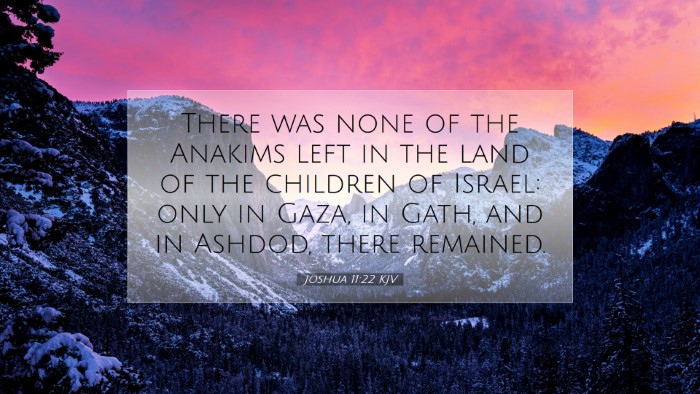Old Testament
Genesis Exodus Leviticus Numbers Deuteronomy Joshua Judges Ruth 1 Samuel 2 Samuel 1 Kings 2 Kings 1 Chronicles 2 Chronicles Ezra Nehemiah Esther Job Psalms Proverbs Ecclesiastes Song of Solomon Isaiah Jeremiah Lamentations Ezekiel Daniel Hosea Joel Amos Obadiah Jonah Micah Nahum Habakkuk Zephaniah Haggai Zechariah MalachiJoshua 11:22
Joshua 11:22 KJV
There was none of the Anakims left in the land of the children of Israel: only in Gaza, in Gath, and in Ashdod, there remained.
Joshua 11:22 Bible Commentary
Commentary on Joshua 11:22
Joshua 11:22 states, "None of the Anakim were left in the land of the children of Israel; they remained only in Gaza, in Gath, and in Ashdod." This verse marks a significant moment in the conquest of Canaan, highlighting God's faithfulness to His promises and the complete fulfillment of His word regarding the land given to Israel.
Overview of the Context
The broader context of this passage is found in the account of Joshua’s military campaigns against the Canaanite kings. Following Joshua's leadership and the Israelites' adherence to God’s directives, numerous strongholds were taken and thus, the land was significantly cleared of its original inhabitants.
The Anakim: A Profile
The Anakim were a race of giants and were feared by many, including the Israelite spies who reported back to Moses in Numbers 13:33, "We seemed like grasshoppers in our own eyes, and we looked the same to them." The verse introduces the conclusion of their presence in Israel's land, a symbolic representation of God's power overcoming formidable foes.
Insights from Matthew Henry
According to Matthew Henry, this passage illustrates God's providence in ensuring that His people were to possess the land devoid of those who opposed them. Henry notes, "The Anakim were the last of the giants in Canaan, and their defeat typifies the eventual triumph over sin and overwhelming obstacles in the Christian life."
Insights from Albert Barnes
Albert Barnes provides further insights by explaining the geographical significance of the Anakim's remaining presence in Gaza, Gath, and Ashdod. He emphasizes, "These cities became key points of conflict later in Israel’s history, particularly in the encounters with Goliath, a formidable Anakim warrior." Barnes points out that, despite the victory, a remnant remained, suggesting that trials and adversities may still linger even after significant spiritual victories.
Insights from Adam Clarke
Adam Clarke elaborates on the text by expressing the importance of this passage in understanding the complete nature of God's promises. He states, "The conquest of the Anakim serves as a powerful reminder of the faithfulness of God to His covenant people, urging believers to remain steadfast in faith, even when giants loom in their lives."
Theological Implications
The theological implications of Joshua 11:22 extend beyond its historical context. It encourages a deep reflection on God's ability to deliver His people from overwhelming odds. Each victorious battle recorded in Joshua signifies God as a warrior who fights for His people. This encompasses the New Testament understanding where believers are called to contend with spiritual giants represented by sin, doubt, and despair.
Faith and Conquest
The narrative prompts leaders and congregants alike to consider the importance of faith when confronting fears, such as those represented by the Anakim. As the Israelites were initially intimidated by these giants, modern believers often encounter their own giants—be they in personal struggles, congregational conflicts, or societal challenges.
Remaining Challenges
The mention of the Anakim remaining in Gaza, Gath, and Ashdod serves as a poignant reminder that while God grants victory, the struggle against sin and spiritual adversaries continues. This serves as an exhortation to maintain vigilance and readiness in faith.
Conclusion
Joshua 11:22 stands as a testament to God’s sovereignty and the assurance of victory for His people. The defeat of the Anakim serves not only as a historical account but one filled with rich theological meaning guiding present-day believers. The insights drawn from Matthew Henry, Albert Barnes, and Adam Clarke collectively affirm the important truth of God's enduring commitment to fulfill His promises and the call for His people to trust Him through every challenge they face.


